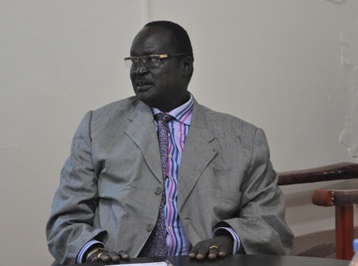Officials say 3m SSP grant misappropriated in Jonglei
October 2, 14 (BOR) –There are claims Jonglei state’s crisis management committee has misused 3 million South Sudanese pounds (SSP) in grant funding it received from the central government in April and May.

The committee, chaired by minister of cabinet affairs Gai Riam, was formed in February to help restore a sense of normality to the state, was the custodian of the funds, which were transferred in cash.
Jonglei was the scene of intense fighting after violence erupted in South Sudan in mid-December last year sparked by a political dispute in the country’s ruling party (SPLM).
Many Bor residents were forced to flee the violence, which also caused widespread damage to public infrastructure.
Riam said the committee had used the money in good faith, but declined to give a detailed account of how the funds were dispersed.
“Although you cannot see any thing, we have used it all; for buying three cars, paid the volunteers who cleaned the town, transporting and accommodating government officials, food among others. It was used in good faith,” the minister said last month.
The funding grant was intended to be spent on the basis of crisis management priorities, which included cleaning the town, improving government infrastructure, travel costs for state government officials and civil servants working in the state ministries to return to Bor, including their accommodation and food.
However, Sudan Tribune understands a Toyota pick-up, five-door land cruiser and a water tank were among the items purchased, contrary to the crisis management priorities:
Bor mayor Nhial Majak, who was also a member of the committee, said he had no knowledge of how the money was spent.
He said one of the main purposes of the funding was to facilitate the cleaning of the town and the removal of bodies for burial when the government returned after crisis.
“It was one of the jobs that looked impossible to be accomplished, but we committed ourselves till we managed it. Those young and old men who did the job will always remain very close to my heart,” Majak told Sudan Tribune.
According to Majak, efforts to clean the town were disrupted after workers went on strike after not receiving their payments, only resuming work after the crisis management chairperson released the funds.
However, Majak, who was one of the direct supervisors of the nine groups deployed to clean the town, said a funding shortfall had to be met from other sources.
“This job did not go unrewarded. I got difficulties, but I managed to give them what was recommended for their hard work. The committee gave them 60,000 SSP first and another 50,000 SSP at last, but that was not enough,” he said.
“I had received a donation of $50,000 from [the] Lutheran World Federation (LWF). I paid off the balances and we took care of the rest,” he added.
Only 210,000 SSP was paid to workers in Bor from the 3 million grant, leaving a balance of 2.79 million SSP unaccounted for.
Majak said there appeared to be a conflict of interest between the priorities of conflict management and certain committee members entrusted with the funds, adding that the grant money was never intended for the purchase of vehicles.
“I think the custodian of the money (3 million SSP), the minister of cabinet affairs had his priorities different from the crisis priorities. I don’t know what he did with the money, but what I know is that he had difficulties to be convinced to pay those who collected dead bodies in Bor town,” said Majak.
“He received the money in cash and we, the other members, never sat to approve how the money would be used. He actually chose to keep the money with him (in Juba) and we were in the field [in Bor] … Culturally, no-one would want to profit from the dead,” he added.
Jonglei’s minister of information and communication, Judy Jonglei, who was also one of the committee members, said the money had been used as it was intended.
“This was for the renovation of the damages that happened in Jonglei state – and in Bor in particular. Three million was approved and it has been used for the purpose of Jonglei state government,” he said.
The 3 million in grant funding was just a fraction of 13 million pledged by the central government to help Jonglei recover from the crisis, although it is still unclear when the remaining 10 million SSP would be released and how it would be dispersed.
The speaker of the state assembly, Peter Deng, said the unsatisfactory use of the funding and lack of accountability of the 3 million had come to the parliament’s attention, but said it would be difficult to achieve enough consensus to take action.
There are also fears that those committee members suspected of misappropriating the funds would simply resign to avoid further investigation.
A member of parliament who spoke on condition of anonymity said the state’s crisis management funding had created another crisis in Jonglei.
“You know, this money, has created crisis. It is [a] crisis within [a] crisis. It is a hot-spot that must be handled with care,” he said.
It is alleged that Riam tendered his resignation in a signed letter in September after travelling to Nairobi for medical treatment, but that members of the minister’s community refuted his resignation before it was official handed over to the governor.
He was subsequently suspended on his return pending an investigation for violating the governor’s order banning ministers from travelling outside South Sudan.
The matter sparked tribal tensions among some officials, but according to well-informed sources Riam was ultimately allowed to remain in his position.
Sudan Tribune has so far been unsuccessful in tracing the alleged letter.
Meanwhile, the Jonglei finance ministry has distanced itself from questions over whether the funding was misused on the basis that it was not wired to the committee through the government’s account.
(ST)
